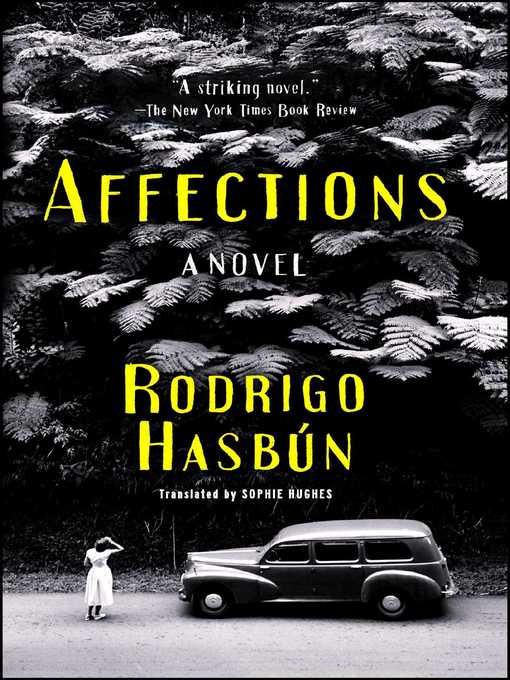
Affections
A Novel
کتاب های مرتبط
- اطلاعات
- نقد و بررسی
- دیدگاه کاربران
نقد و بررسی

July 24, 2017
The Ertl family produced two infamous members whose lives are fictionalized in Hasbún’s moody and spare novel. Hans Ertl was a famous Nazi cinematographer exiled to Bolivia after World War II, where he became obsessed with finding the Lost City of Paititi. His eldest daughter, Monika, who accompanied him on an expedition to find the mythological land, married into a wealthy family before becoming radicalized, joining the Marxist revolutionary movement, and becoming a guerilla fighter. All of this is known as fact, but through his measured and oddly ethereal writing (reminiscent somewhat of Paulo Coelho), Hasbún creates a sort of double exposure of the Ertl family’s slow demise over the upheaval roiling through South America. The impact of Hans’s restlessness on his family—his three daughters and their mother—frames the narrative, which unfolds through multiple points of view. Somehow, it is Trixi, the sister who stayed behind with her mother while the rest of the family sought Paititi, whose staid narrative provides the most powerful moments: from her unhappy, cancerous mother deliberately introducing her to cigarettes at age 12, to the devastating paragraph in which Monika corrects Trixi’s naive belief that her older sister’s lover died accidentally: “They kicked his spine until it snapped.” This is an inventive, powerful novel.

April 1, 2017
Named one of Granta's 22 Best of Young Spanish-Language Novelists in 2010 and one of the "Bogota 39" at 2007's Hay Festival, Bolivian-born, Texas-based Hasbun makes his English-language debut with a slim but juicy-sounding novel based on a real-life individual. Cameraman for Nazi propagandist Leni Riefenstahl, Hans Ertl flees with his family to Bolivia shortly before the end of World War II. There, he becomes fascinated with the lost Inca city of Paititi and persuades two of his daughters to join his efforts to find it.
Copyright 2017 Library Journal, LLC Used with permission.

Starred review from August 1, 2017
A German family heads to Bolivia after World War II, sparking decades of internal strife amid political revolution.Hasbun's brisk, sensitive U.S. debut is a fictionalized story of the Ertl clan, which emigrated to escape the ruins and political embarrassments of Nazism. (Patriarch Hans worked as an assistant to propagandist Leni Riefenstahl.) But Hans' dream of exploring a new land absent politics slowly erodes. Central to that shift is his daughter Monika, who, after a failed marriage, joins Che Guevara's revolutionaries; "she felt that she had at last found her place in the world." Her decision, and the violence that follows it, creates a blast radius around the rest of the family, especially her sisters, Trixi and Heidi. But though Hasbun's narrative is rooted in politics, its key strengths are his remarkable command of time and characterization. The novel is short but gallops across a half-century's worth of transformations in Bolivia, and sections narrated by individual characters are marked by a surprising depth of emotional detail given the story's brevity. Reinhard, the brother of Monika's husband, can't reconcile "the intriguing Monika from the early days with the impossible Monika later on." Heidi describes the disoriented family as like "soldiers searching for a war, or interplanetary beings," while Trixi laments the "doses of horror" that Monika's radicalization created; Monika herself hardens over time, becoming someone with "no emotion, no memory." More detail about each of these characters would be welcome; the book feels at times like an epic historical saga that's been cut down to size by an especially aggressive editor. But in stripping down the story to its barest essence, Hasbun has intensified the effects of each individual scene; the volumes' worth of drama contained in the family's life emerge by suggestion and implication. A one-sitting tale of fragmented relationships with a broad scope, delivered with grace and power.
COPYRIGHT(2017) Kirkus Reviews, ALL RIGHTS RESERVED.

Starred review from August 1, 2017
In his English-language debut, Bolivian novelist Hasbun weaves together a fictional tale about a real-life family struggling to find stability in a world of shifting ideologies and relationships. In the aftermath of WWII, the Ertls emigrate from Germany to Bolivia, settling in La Paz, where they live in relative bliss. That is, until the family patriarch, Hans, once the cameraman for a Nazi filmmaker, sets out with a video camera and two of his three daughters to find the lost Amazonian city of Paititi. They fail, and when they return home, the family's disintegration is underway. Hans' ambitious daughter Monika falls in with Che Guevara's Marxist guerrillas, quickly rising up the ranks. Lovestruck Heidi just wants to marry and return to Munich. Trixi, the youngest, appears to be following in the fateful steps of their sickly mother, a heavy smoker who dies early. The story unfolds through the perspectives of Hans' daughters and other narrators, spanning more than a decade at a quick pace which belies the fact that Hasbun writes with patience and precision, revealing the family's most intimate thoughts and interactions: first smokes, blind love, and familial devotion. This is a novel to savor for its richness and grace and its historical and political scope.(Reprinted with permission of Booklist, copyright 2017, American Library Association.)

























دیدگاه کاربران